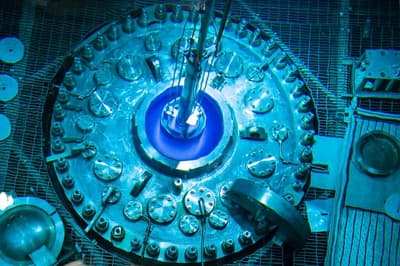A Texas A&M University-led consortium has been awarded a two-year, $2 million grant from the U.S. Department of Energy (DOE) to establish a first-of-its-kind traineeship program in isotope research and development, production and processing that aims to develop the future isotope production workforce for the nation and the DOE Isotope Program (IP).
Texas A&M will serve as the isotope traineeship coordination (ITC) site in collaboration with a team of 14 institutions of higher learning, including Texas Lutheran University (TLU), and three DOE national laboratories (Argonne National Laboratory, Lawrence Livermore National Laboratory and Los Alamos National Laboratory). The unprecedented initiative represents a concerted effort to boost exposure to the field of isotope science and accelerate the time it typically takes for a junior scientist to enter the workforce.

Each day, these critical people and positions make untold contributions to the nation’s prosperity and security in support of DOE IP activities, including producing critical isotopes in short supply with broad applications in medicine, national security, domestic and global industry, and discovery research.
TLU Physics Department Chair Dr. Toni Sauncy says this collaboration is going to offer new career preparation or opportunities for students.
“Being part of a large, multi-institutional initiative funded by the Department of Energy places TLU students on equal footing with students around the country,” she said. “The DOE initiative to seek out and engage a diverse talent pool to contribute to an important national need opens doors and brings opportunities for TLU students. Nuclear physics is a small part of the undergraduate curriculum at TLU, so this research opportunity broadens the student perspective into careers they might not have considered before, even for students that are not directly connected in the project.”
Texas A&M Cyclotron Institute Director Dr. Sherry Yennello serves as the principal investigator and director for the novel ITC collaboration, known as the Horizon-broadening Isotope Production Pipeline Opportunities (HIPPO) program, which features 17 co-principal investigators. HIPPO will also broaden and diversify the next-generation workforce by promoting innovative and transformative approaches to isotope production and processing as well as student recruitment and preparation.
The HIPPO team plans to recruit a diverse population of approximately 20 undergraduate and 10 graduate students currently enrolled at the participating institutions. The goal is to expose students to a broad swath of isotope production-related activities while focusing on specific isotope production research projects that can be contextualized to trainees’ own research careers via collaborative networking and a variety of in-person and virtual training mechanisms at national laboratory and university isotope network production sites involving both HIPPO and peer mentors.
TLU students will be involved in isotope production related research during the academic year and at another HIPPO campus during the summer. In similar fashion, undergraduate students will spend a week at a national laboratory learning about isotope production and then one or more additional weeks at a HIPPO campus doing related research.

“Unfortunately, neither nuclear nor isotope science are standard components of undergraduate STEM education, which severely limits the number of potential students who might pursue education, training and careers in isotope production,” Yennello said. “To help broaden the career pathways of highly trained students and researchers, the HIPPO program will recruit from our member institutions and affiliated minority-serving institutions to build a diverse cohort of students interested in exploring their potential career opportunities. Allowing them to earn money doing science as undergraduates will relieve financial stress while also demonstrating the fact that they could earn a living doing nuclear science research related to isotope production.”
Beyond developing a pipeline for Ph.D.-level scientists to contribute to future isotope production research efforts, HIPPO also will be vital for attracting students to fill opportunities at the bachelor and master’s levels. Skilled and knowledgeable technicians with backgrounds in chemistry, physics and engineering are highly sought after to fill positions as operators for accelerator and reactor production sites, to conduct isotope production, processing and quality control functions, and to perform maintenance of the complex equipment required for delivering on DOE IP missions.
“Any time TLU can be on a list with prestigious universities and national labs around the country as part of a new federally-funded nationwide initiative the TLU STEM effort is elevated and enhanced as TLU is recognized as a valuable partner,” Sauncy said. “TLU Physics students will be part of a network of institutions and national labs that will provide a broad range of experiences and lead to opportunities for their future career paths.”
About the Cyclotron Institute: Dedicated in 1967, the Cyclotron Institute serves as the core of Texas A&M University’s accelerator-based nuclear science and technology program. Affiliated faculty members from the Department of Chemistry and the Department of Physics and Astronomy conduct nuclear physics- and chemistry-based research and radiation testing within a broad-based, globally recognized interdisciplinary platform supported by the United States Department of Energy (DOE) in conjunction with the State of Texas and the Welch Foundation. The facility is one of five DOE-designated Centers of Excellence and is home to one of only five K500 or larger superconducting cyclotrons worldwide. To learn more, visit cyclotron.tamu.edu.
